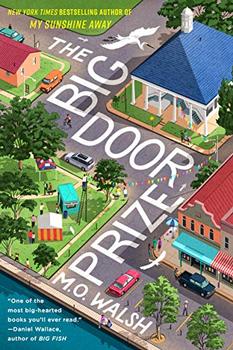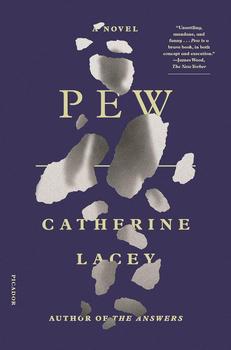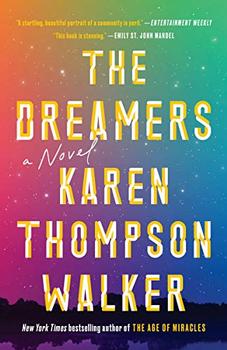Summary | Excerpt | Reviews | Beyond the book | Read-Alikes | Genres & Themes | Author Bio

M.O. Walsh's The Big Door Prize is a tale about destiny and free will and the lengths to which some will go in an attempt to fulfill their heart's desires. It took me a little while to get into the story, but once I did I began to approach it as a contemporary morality tale, and I was reminded of the films Gattaca (1997) and Pleasantville (1998).
In small-town Deerfield, Louisiana, residents go about their regular lives, until one day the DNAMIX machine appears next to the customer service counter at the front of the local grocery store. A "simple-looking machine" that resembles a "photo booth at the mall or parish fair," the DNAMIX, when provided with a DNA sample, prints out a blue slip of paper that does nothing less than "tell you your potential in life, what your body and mind are capable of doing, based on the science of DNA." The machine becomes a smash hit as nearly every Deerfield resident lines up to discover their latent talents or long-forgotten dreams.
Residents receive printouts that give them categorizations such as "Carpenter," "Entrepreneur" or "Cowboy," and most are eager enough to take a chance on their potential. But the blue ticket that causes the most upheaval is Cherilyn Hubbard's. By any measure, she and her husband Douglas have a loving, stable marriage, but Cherilyn's DNAMIX readout skews her take on reality in an instant, kickstarting the narrative action by throwing her entire existence into question as she begins to wonder what she has missed out on by marrying her high school sweetheart and staying in Deerfield.
Instead of examining the problems of determining a person's potential via DNA analysis, the novel focuses on the emotional fallout that occurs when we feel our potential doesn't align with reality, and skirts around the idea that sometimes it takes outside permission to admit this discrepancy and do something about it. It is only after receiving her DNAMIX printout that Cherilyn takes any interest in the world outside of Deerfield, although this interest is quite shallow. While perusing a history textbook, she laments her inability to pronounce the name of a Saudi prince, and after researching royalty online she finds it "nice to be reminded [...] that the Internet was useful." Nearly all of the town's residents seem to lack the agency to even think about change or something different than what they know until the arrival of the DNA machine.
Although the entire narrative is set in motion by the printouts from the DNAMIX machine, genetic science does not feature prominently in the story, but instead serves as a convenient excuse for people to finally strive for their dreams. There is a good reason for the relative lack of science in the novel, although disappointingly we don't find this out until the final few pages of the narrative. Walsh sets himself up to write a sequel, or prequel, to The Big Door Prize with the information he provides in the last chapter. In my opinion, a story that had included this information sooner would have been a more interesting one to tell.
In addition to the main story revolving around the DNAMIX machine, teenagers Jacob and Trina grapple with untimely death and violent betrayal in a narrative arc that at times feels a bit shoehorned in. Their story offers the briefest of glimpses into topical issues like online bullying, sexual abuse and school shootings, and could stand on its own as a separate short story or novella. As it is, the realistic drama the teens deal with provides a dose of gravitas amid the absurdity of the adults acting on their DNAMIX readouts.
The novel is bookended by two sections of questions and answers posed directly to the reader, a technique that I found rather heavy-handed. Several times throughout the narrative Walsh breaks the fourth wall in order to address the reader, but thankfully these interruptions become less frequent as the story progresses. With some truly laugh-out-loud funny moments (there's a glorious episode where a priest, a mayor and a teacher actually walk into the local bar, and the priest exclaims, "Hey, have you heard the one about us?"), Walsh's writing style is light, which veils some of the more serious elements in the story as the characters navigate "what-ifs" that are suddenly real.
The Big Door Prize is a modern fable that explores issues of choice, personal potential and the myriad ways people go about getting what they want. Although it stops short of examining any of the complex repercussions surrounding such issues, the novel packs a surprisingly serious punch under its quaint, all-American, feel-good veneer, and it left me thinking about it long after I finished the final sentence.
![]() This review was originally published in The BookBrowse Review in October 2020, and has been updated for the
September 2021 edition.
Click here to go to this issue.
This review was originally published in The BookBrowse Review in October 2020, and has been updated for the
September 2021 edition.
Click here to go to this issue.

If you liked The Big Door Prize, try these:

by Catherine Lacey
Published 2021
A figure with no discernible identity appears in a small, religious town, throwing its inhabitants into a frenzy.

by Karen Thompson Walker
Published 2019
An ordinary town is transformed by a mysterious illness that triggers perpetual sleep.
Your guide toexceptional books
BookBrowse seeks out and recommends the best in contemporary fiction and nonfiction—books that not only engage and entertain but also deepen our understanding of ourselves and the world around us.